Steps to Correct Errors on Your Criminal Background Check
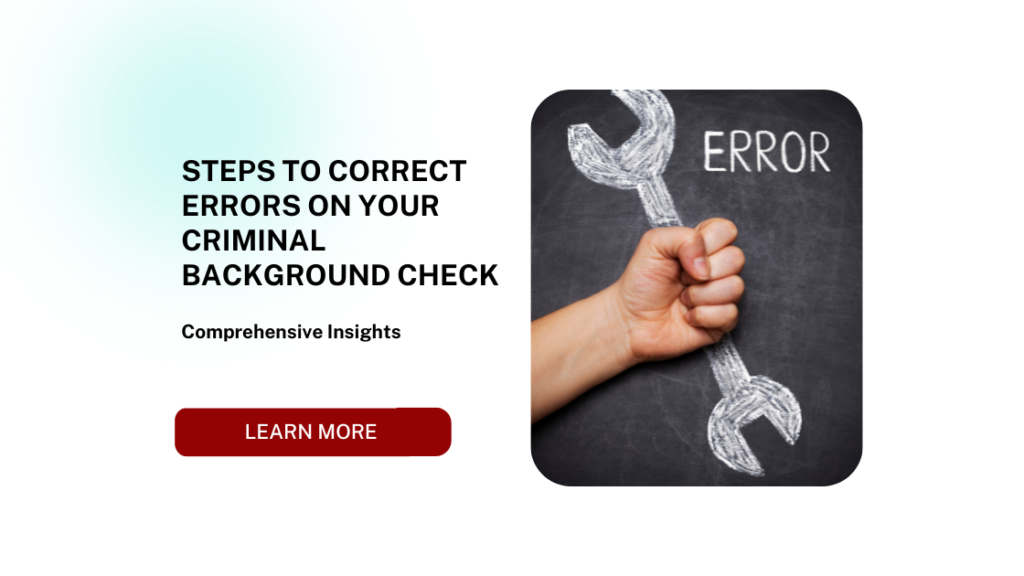
Understanding Errors on Criminal Background Checks
Criminal background checks play a critical role in hiring, housing, and other areas of life where trust and credibility are paramount. However, errors in these checks can have significant consequences, including job loss, denial of housing, or damaged reputations. Understanding these errors and how they occur is the first step to resolving them effectively.
The Importance of Criminal Background Checks
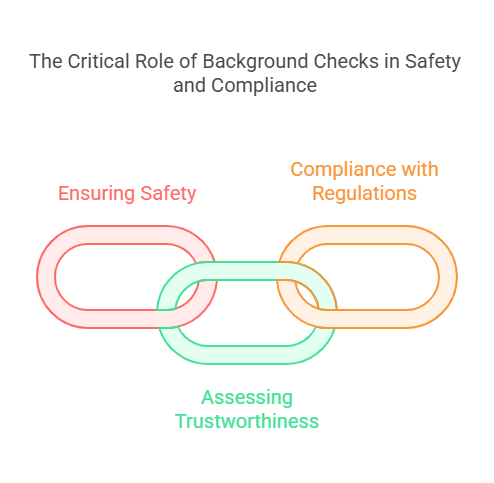
Employers, landlords, and organizations rely on criminal background checks to make informed decisions. These checks provide a detailed record of an individual’s criminal history, which can include arrests, convictions, and even traffic violations in some cases.
Why Criminal Background Checks Are Essential:
- Ensuring Safety: Employers and landlords prioritize the safety of their workplaces and communities.
- Assessing Trustworthiness: Background checks help gauge an individual’s reliability and adherence to laws.
- Compliance with Regulations: Certain industries (e.g., healthcare, finance) are legally required to conduct thorough background screenings.
While these checks aim to provide accurate and reliable information, errors can occur, leading to unfair consequences for individuals.
Common Mistakes on Criminal Background Checks
Errors on criminal background checks can arise from various sources. Here are some of the most common types of mistakes:
| Error Type | Description | Impact |
|---|---|---|
| Identity Mix-Ups | Mistakenly associating someone else’s criminal record with your name. | Loss of opportunities due to someone else’s record. |
| Outdated Information | Retaining records of convictions that were expunged, dismissed, or sealed. | Misrepresentation of your legal status. |
| Clerical Errors | Typos or inaccuracies in personal information like name, date of birth, or Social Security number. | Incorrect record matching. |
| Duplicate Entries | Multiple entries for the same offense, making the record appear more severe. | Overstated criminal history. |
| Unreported Resolutions | Failing to update dismissed charges or resolved cases. | Incomplete or misleading information. |
How Mistakes Occur
Errors on criminal background checks can originate from several sources, including:
- Data Entry Errors: Human mistakes during data input can lead to inaccuracies.
- Incomplete Records: Agencies may not update records promptly when cases are resolved or dismissed.
- Mismatched Records: Similar names or incomplete identifying details can result in identity mix-ups.
- Third-Party Reporting Errors: Background check companies may pull outdated or inaccurate information from databases.
Why It’s Important to Address Errors Promptly
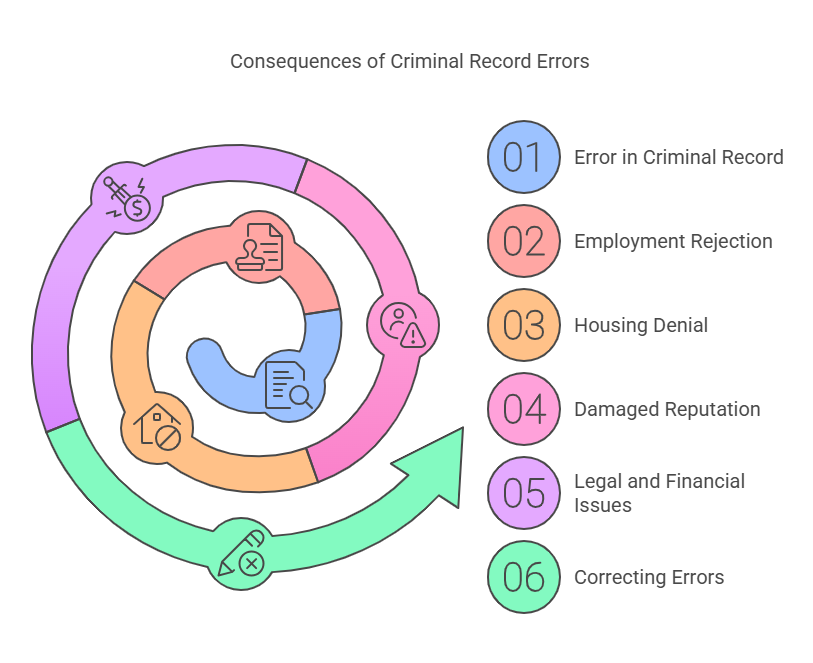
Mistakes on your criminal background check can have lasting consequences, such as:
- Employment Rejections: Employers may reject your application based on inaccurate records.
- Housing Denials: Landlords might refuse to rent properties to individuals with erroneous criminal histories.
- Damaged Reputation: Even minor errors can tarnish your personal and professional credibility.
- Legal and Financial Ramifications: Incorrect records can result in legal disputes or lost income opportunities.
Prompt action to correct errors not only restores your reputation but also ensures that you can access opportunities without unfair barriers.
How to Identify Errors on a Background Check
The first step in fixing a mistake is recognizing it. Follow this step-by-step guide to thoroughly review your background check:
Step 1: Obtain a Copy of Your Background Check
Request a copy of the report from:
- The Employer or Requesting Party: Organizations are typically required to share the report upon request.
- The Reporting Agency: Under the Fair Credit Reporting Act (FCRA), you’re entitled to a free copy of the report if adverse action is taken based on its contents.
Step 2: Cross-Check Your Personal Information
Verify that the following details are accurate:
- Full name (spelling and order).
- Date of birth.
- Social Security number.
- Address history.
Step 3: Examine Criminal Records
Review the criminal history section for:
- Offenses that don’t belong to you.
- Duplicate entries for the same offense.
- Cases that were dismissed, sealed, or expunged but still appear.
Step 4: Verify Employment and Education Details
Some background checks include employment and education verifications. Ensure that all details reflect your correct history.
Most Common Types of Errors and Their Impacts
| Error | Example | Impact |
|---|---|---|
| Incorrect Criminal Record | A conviction listed under your name that isn’t yours. | Leads to disqualification from jobs or housing opportunities. |
| Outdated Case Status | A dismissed case still showing as active. | Misrepresentation of your current legal standing. |
| Mismatched Identity | Records of someone with a similar name appearing on your report. | Loss of reputation and trust. |
| Data Entry Errors | Wrong date of birth or Social Security number linking you to another record. | Inaccurate depiction of your history. |
Tools for Reviewing Background Checks
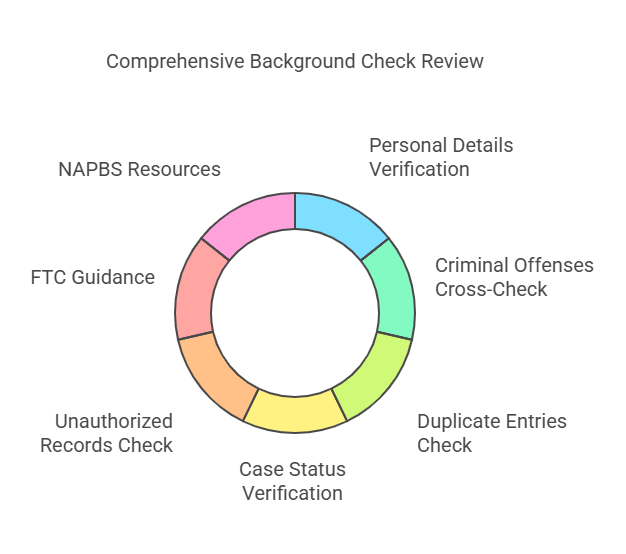
Checklist for Background Check Review
Use the following checklist to ensure a comprehensive review of your background check:
- Verify your personal details (name, date of birth, Social Security number).
- Cross-check all listed criminal offenses.
- Look for duplicate or outdated entries.
- Ensure dismissed or resolved cases are marked correctly.
- Confirm that no unauthorized third-party records are included.
Online Resources for Background Check Assistance
- Federal Trade Commission (FTC): Provides guidance on consumer rights under the FCRA.
- National Association of Professional Background Screeners (NAPBS): Offers resources for disputing errors.
Steps to Fix a Mistake on Your Criminal Background Check
Correcting errors on your criminal background check is crucial to avoid unfair disadvantages in employment, housing, or other opportunities. This section provides a detailed, step-by-step guide on how to address mistakes and highlights best practices to ensure the process is seamless and effective.
Why Acting Quickly Is Critical
Once you identify an error, it’s important to act immediately. Delays in addressing mistakes can lead to missed opportunities and prolonged negative consequences, such as:
- Job Rejections: Employers may move on to other candidates while you wait to correct your report.
- Lost Income or Benefits: Inaccuracies can prevent you from accessing financial support or professional advancement.
- Ongoing Misrepresentation: Unresolved errors can remain on file, affecting future background checks.
Timely action can help restore your reputation and ensure that your record reflects accurate information.
Steps to Fix a Mistake on Your Criminal Background Check
Step 1: Request a Copy of the Background Check
Start by obtaining the specific report that contains the error. You can request it from:
- The employer or organization that conducted the background check.
- The Consumer Reporting Agency (CRA) or third-party service that provided the report.
- Your state’s background check system, if applicable.
Under the Fair Credit Reporting Act (FCRA), you’re entitled to a free copy of the report if it’s used to deny employment, housing, or other opportunities.
Step 2: Identify the Errors
Review the report carefully for any inaccuracies. Pay special attention to:
- Personal Details: Ensure your name, date of birth, and Social Security number are correct.
- Criminal History: Look for records that don’t belong to you, outdated information, or resolved cases listed incorrectly.
- Duplicate Entries: Verify that offenses aren’t repeated multiple times.
Step 3: Gather Supporting Documentation
Collect evidence to support your claim that the report contains errors. Examples include:
- Court Documents: Proof of dismissed, expunged, or sealed cases.
- Identity Verification: Copies of your ID, Social Security card, or passport to address identity mix-ups.
- Employment or Education Records: If errors involve job history or qualifications.
Step 4: Dispute the Errors with the Reporting Agency
Contact the CRA or agency responsible for the report and file a dispute. Most agencies have specific procedures for submitting disputes, often requiring:
- A written explanation of the error.
- Supporting documentation.
- A copy of the background check with errors highlighted.
Key Tip: Use certified mail to send your dispute, ensuring you have proof of delivery.
Step 5: Notify the Employer or Requesting Party
Inform the organization that requested the background check about the inaccuracies and your efforts to resolve them. This proactive communication may prevent adverse decisions based on incorrect information.
Step 6: Follow Up on the Dispute
Under the FCRA, reporting agencies are required to investigate disputes within 30 days. After the investigation:
- If the error is verified, the agency must correct it and provide you with an updated report.
- If the agency does not find an error, you have the right to add a statement of explanation to your file.
Best Practices for Resolving Background Check Errors
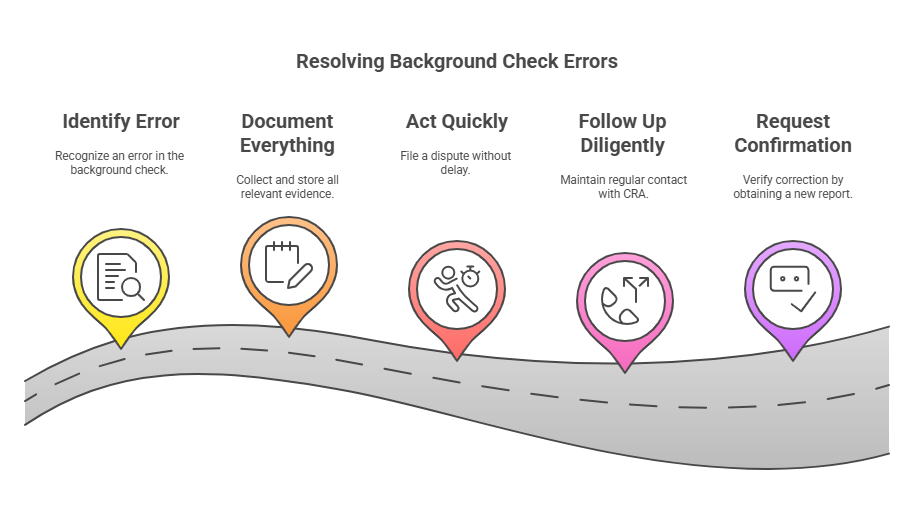
- Document Everything: Keep copies of all correspondence, evidence, and communication related to your dispute.
- Act Quickly: Don’t delay in filing a dispute once you identify an error.
- Follow Up Diligently: Stay in contact with the CRA to ensure your dispute is being processed.
- Request Confirmation: After the error is corrected, request a new copy of your report to verify that all inaccuracies are removed.
How Exact Background Checks Can Help
Fixing errors on a criminal background check can be a daunting process, but services like Exact Background Checks can simplify the experience.
Why Choose Exact Background Checks?
- Expertise in Background Screening: We ensure that reports are accurate and compliant with all legal standards.
- Dispute Resolution Assistance: Our team helps individuals navigate the process of correcting errors efficiently.
- Reliable Results: Our state-of-the-art systems minimize the risk of inaccuracies.
Related Services We Offer
- Comprehensive Background Screening: For employers and individuals seeking accurate and detailed reports.
- Employment Verification: Ensuring job history details are correctly documented.
- Income Verification: For housing applications and financial reviews.
- Compliance Assistance: Helping organizations meet state and federal regulations for background checks.
Resources to Streamline the Correction Process
Here are some useful resources to assist you in disputing and correcting errors:
- Federal Trade Commission (FTC): Consumer Rights Under the FCRA
- Information on your rights regarding background checks and dispute processes.
- AnnualCreditReport.com: Free Report Access
- Request credit reports that may include background check data.
By leveraging these tools and resources, you can navigate the correction process with greater confidence and ease.



